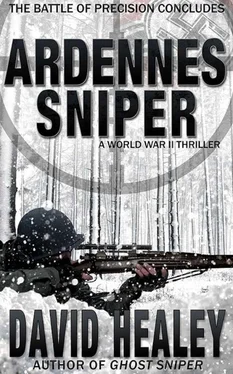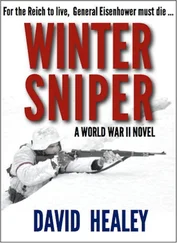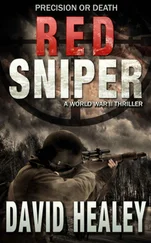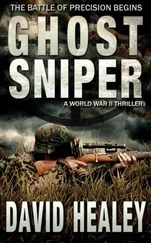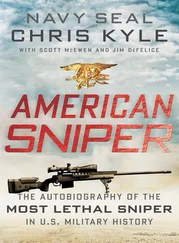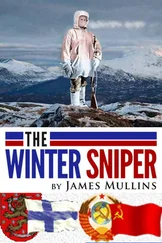“Sir, we think the Germans are going to retreat through the woods just west of town.” Quickly, Mulholland explained Cole’s theory.
The colonel listened impatiently, taking long pulls from his mug of coffee, then throwing the dregs into the fire. The wood sizzled and steamed. He held up a hand, interrupting Mulholland.
“Lieutenant, I’ve heard enough. The Germans are going to try to fight their way out. They will try to come down this road and skedaddle back to Germany. If they went through the woods, they would have to walk out, and that’s not going to happen. An SS panzer group is not going to abandon its armor.”
“But sir, Cole here—”
“Lieutenant, what’s your name?”
“Mulholland, sir.”
“Mulholland, I hope to hell that you are not in charge of anything important. What unit are you with?”
“We’re snipers, sir.”
The colonel narrowed his eyes at Mulholland. “Right, now I remember you from the briefing. Snipers, huh? Sneaky bastards. Well, go shoot a few Krauts in the back, and leave the strategy to me. Meanwhile, I am putting every gun I can on the roads out of town for when these Krauts bastards do try to break out.”
Another officer came in, and the colonel turned his attention away from them. Mulholland put his helmet back on and stamped out of the house, with Cole following him. After the warmth of the house, the cold hit them like a hammer.
“We tried, Cole,” the lieutenant said. “If what you say is true, the Germans are going to walk out of La Gleize by the back door while we’re guarding the front door.”
“At least one of them Germans won’t get very far, if I can help it,” Cole said. “Thank you for going to the colonel with this, sir. With any luck, he won’t hold it against you when he wakes up tomorrow and the Germans are gone.”
“It’s all right, Cole. Who said I ever wanted to make captain?”
• • •
“You’re comin’ with me, Kid. I need some help,” Cole said.
“Why me? You know I can’t shoot worth a darn.”
“This isn’t about shooting. I need me an assistant.”
“An assistant what?”
Cole thought about that. “Assistant ass kicker. How does that sound?”
Cole had already scouted the buildings in and around the hamlet. In an old barn, Cole had spotted just what he needed. Hung up on a nail high up on an old beam. Steel traps. The massive jaws measured nearly a foot across when opened. Cole had done his share of trapping, but he had never used traps so big. Mostly likely because he had never gone after wolves or bears. He guessed that the traps were very old. Antiques even. After all, when was the last time a beast of that size had prowled the Ardennes Forest?
Cole took them down and inspected the traps. Rusted shut. Getting one to function would require some work, which is why he had brought along the Kid.
“Got to be some oil around here. See what you can find.”
The Kid returned with an old-fashioned oil can that might be used for a bicycle chain. Cole knocked off most of the loose rust. He soaked the trap in oil.
“All right, now I want you to stand on the springs. Whatever you do, don’t take your weight off. I want to keep all my fingers.”
The trap itself was a simple mechanism. The “jaws” of the traps were shaped like the curved portion of a capital letter D. Powerful springs were shaped like “greater than” and “less than” signs < > slid along the curved part of the D. When the Kid stepped on the springs, compressing them, the jaws of the D opened, revealing rusty serrated teeth.
Cole applied more oil and worked at the trap with a wire brush. By fitting a metal latch into a notch at the base of a flat metal pan, the jaws stayed open. He was careful to work from beneath the jaws — if they accidentally snapped shut, he did not want to lose a hand.
Once the trap was set on the barn floor, he handed the Kid a spare ax handle he had found.
“Go ahead and see if that thing works.”
The Kid touched the pan with the ax handle and the trap sprang shut with an audible snap, steel teeth digging deep into the wood. The Kid stepped back in surprise, as if the trap might bite him next.
“That thing is like a land mine!”
Cole nodded, then stepped on the springs to release the ax handle. “That ax handle is about as thick as a leg bone, only bones act more like green wood. But it gives you an idea.”
In the dim light of the barn, Cole’s grin made the Kid step back, just as the trap snapping shut had done. His teeth gleamed.
“What are you gonna do with that trap?”
“Not just me, Kid. You know that Nazi with the scar who shot up your buddies in that field? He shot up that church today, too, and killed that girl. We’re goin’ to make sure he gets what he deserves.”
• • •
Cole wrapped the trap carefully in cloth so that it would not make any noise. The last thing he needed was for the trap to be clanking and rattling around to give him away. He would be crawling into the German lines to set this trap. He left his rifle with the Kid, but carried a Browning 1911 in case any of the Germans turned out to have sharp ears. Slung across his shoulders by loops of string, he also carried a large hot water bottle that he had found in a ruined house.
“Cover me,” he said to the Kid, who was now equipped with Vaccaro’s scoped Springfield.
Wearing his makeshift white winter camouflage, Cole seemed to disappear into the vast snowy field within a few steps.
Long years of hunting enabled him to move silently through the field. His feet did not so much as crunch on the snow. Cole could have been floating, so silently did he move.
The Germans had sentries, but they were watching for tanks, not a lone soldier. No matter — they neither heard nor saw Cole approach. He located the machine gun nest where the Kid had spotted the SS sergeant with the scarred face that afternoon. Just as he expected, nobody was manning the gun — the Germans had called it quits once darkness fell because the Americans were unlikely to make a nighttime attack. The gun could be ready in seconds if they needed it.
The machine gun was still there — even if the Germans planned on abandoning La Gleize, they would need someone to cover their retreat. Cole was betting that job would fall to this particular machine gunner, who seemed so good at his job.
Cole found the path where the soldiers had waded through the snow to the machine gun nest. He was now within the town limits. One wrong move and the Germans would find him. This was maybe the craziest thing he had done yet in this war. His heart pounded.
A couple of Germans went past, carrying boxes of supplies, rifles slung over their shoulders. They talked quietly to each other in their guttural language, which reminded Cole of rocks grinding together. He kept the Browning ready. They passed so close that he could have touched them with the barrel. Once they had walked on, Cole let his breath out. For the moment, he was alone again. He had better hurry.
Because the machine gun was well hidden, the only time that the machine gunner was exposed was when he crossed to the nest, or returned. Cole planned to trap him out in the open.
He could see where the German had to step down from a stone ledge as he made his way to the machine gun — his feet had sunk deeper here into the snow. It was just the place to set the trap.
He opened the jaws carefully. Even with a new coat of oil, it was like prying open the jaws of a lion. His own weight was barely enough to depress the springs, and the cold made his fingers less than nimble when setting the pan trigger. Then he took a water bottle and poured the steaming water slowly into the ground near the trap, melting the frozen earth. When he was satisfied that the hot water had done its work, he worked a long metal stake deep into the earth, securing the trap’s chain. By morning the ground would be frozen again, hard as concrete. He kicked snow over everything to hide it.
Читать дальше
